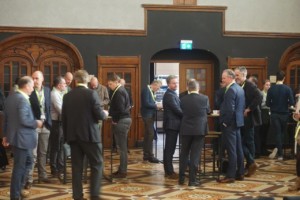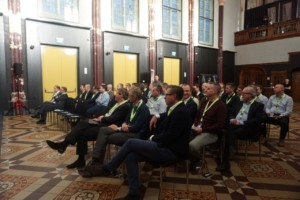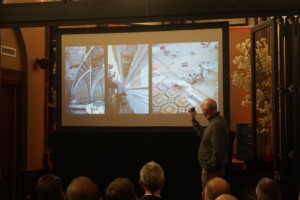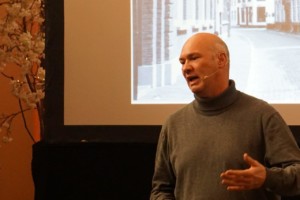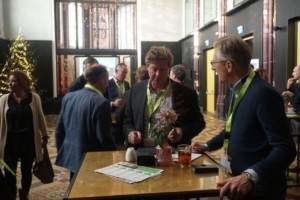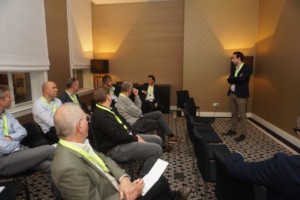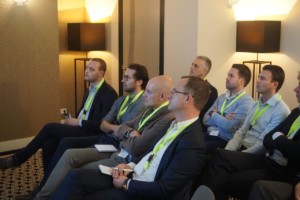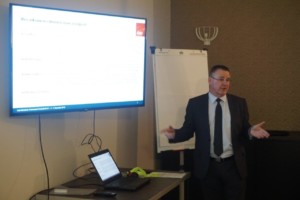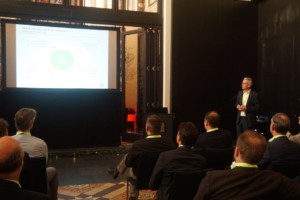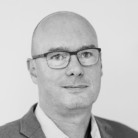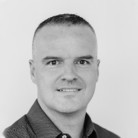We are always thinking one step aheadConsulting, Engineering & Optimization in Logistics Networks
How can we help you?
How to stay in control when developing new logistics real estate?
Hotel Nassau in Breda, the Netherlands, provided a stunning setting for the Groenewout inspiration session on ‘Logistics new-build projects’ on 11 December. The attendees could choose between three breakout sessions: staying in control, WELL certification, and the financial aspect of new-build projects. “Events like these are a brief escape from the everyday chaos.”
Mari van Kuijk opened the session with a word of welcome for the 50 attendees – primarily logistics professionals from property developers, investors and users of logistics real estate. He then handed over to architect Lukas Ruijs from C5 Architecten who explained how the venue – a former convent – had been transformed into a magnificent, contemporary hotel. Then it was time for the breakout sessions.
Measuring, validating and monitoring
“Is WELL certification more than just a hype?” asked Wytze Boekhout from the consultancy firm C2N. WELL provides a framework for measuring, validating and monitoring how a building’s features support the health and well-being of its users, resulting in greater employee satisfaction and productivity. The starting point for WELL is the user rather than the building itself. Over the past two years, the number of applications for WELL in the Netherlands has risen from just four to more than 35. One attendee claimed that a distribution center in Tilburg has almost completed the certification process. WELL appears to be focused mainly on office buildings for now, not least because the certification costs are based on the number of square meters of an asset. In view of the size of logistics facilities, it would make sense to adapt this approach. But after some discussion the attendees concluded that, rather than being a hype, WELL is here to stay.
Download the presentation of Wytze Boekhout, C2N
The financial game
Jan van den Hogen from DekaBank, an institutional investor, provided a succinct overview of the financial game around property investment. He explained that there are four key revenue flows: “Cash flow (rent), value increase, leverage and tax structures.” The most important factor in terms of making a profit is a multi-year market-rate rental agreement. “Tenants could easily ask for a share of the profit generated during the development phase to fund startup costs in their processes, but the majority of them don’t.” A developer in the audience commented that the situation is a little more complex in practice – which Van den Hogen did not dispute – and that tenants receive incentives. Van den Hogen: “What I want to illustrate is that today’s investors often aren’t concerned about the bricks or the difference between the construction costs and the sale price, but rather about the long-term cash flow. This means that, for investors, a DC is a financial product.”
Download the presentation of Jan van den Hogen, DekaBank
Staying in control
The logistics real estate market is booming. If your company is looking for a new location, what should you watch out for and how can you manage and design the search process? It is important to try to gain control of the fundamental process yourself, explained Mari van Kuijk. In his presentation, he discussed how to make sure you receive directly comparable proposals, why you shouldn’t take your project to market too quickly, and about alternative routes to reaching a rental agreement. Van Kuijk: “These are all things that are primarily aimed at ensuring you – as the tenant/user – stay in control of this game and at helping you to translate the value that you add by agreeing to rent the property into benefits for your project.”
Download the presentation of Mari van Kuijk, Groenewout
There was time for networking both during the break and at the end of the session, and the attendees made eager use of the opportunities. Jan Walraven, Director Supply Chain Development at Staples, was positive about the event, which was not his first experience of a Groenewout inspiration session: “They are short and effective events that offer a brief escape from the everyday chaos. I found the DekaBank presentation very interesting and it has set me thinking. Maybe we should try to involve the investor earlier on in the development process in order to reduce the startup costs.”


